The small Inner Banks community of Aurora, best accessed by the NCDOT run Bayview / Aurora ferry, can be easily overlooked by most Eastern North Carolina visitors, but for fossil fans, the town is an incredible attraction, thanks solely to the Aurora Fossil Museum.
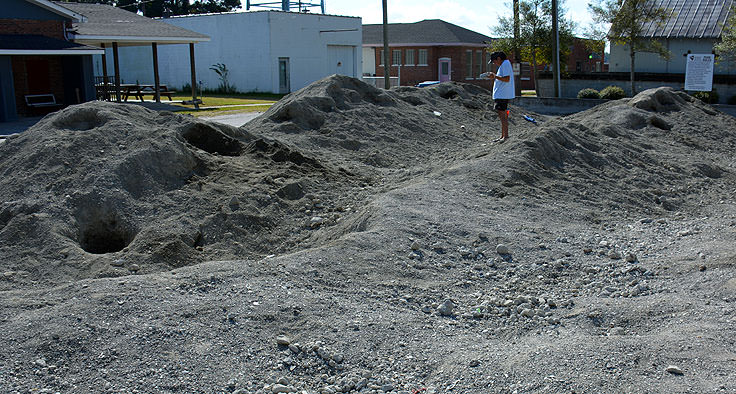
Founded in 1976 as a nonprofit museum and fossil education resource center, the museum seeks to both educate and attract new budding geologists and archeologists by featuring the native relics and finds, and inviting explorers to dig for their own treasures in the renowned "Pit of the Pungo."
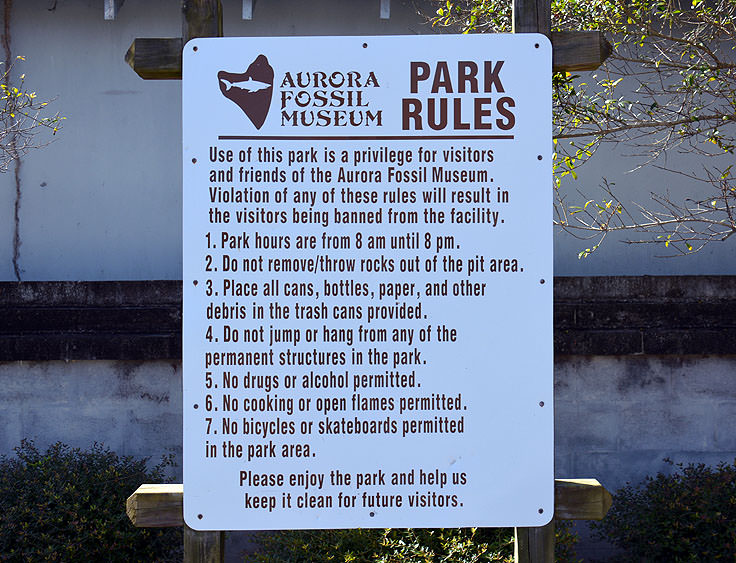
The interior Fossil Museum, housed in a downtown brick building, is a treasure in itself with a wide array of exhibits excavated from the piedmont, coastal and Inner Banks' regions. At the museum, explorers of all ages will marvel at the local finds, which include massive shark jaws, local Native American arrowheads and artifacts, and prehistoric relics and Megatoothed shark teeth that can easily be up to 15 million years old. Because of Aurora's nearly-coastal location, the museum's star exhibits include hundreds of Pleistocene, Pliocene and Miocene marine fossils on display, most of which were excavated from the famous PotashCorp mine, (formerly referred to as Lee Creek), known in archeology circles as ones of the most important sources of Pliocene and Miocene fossils in the world.
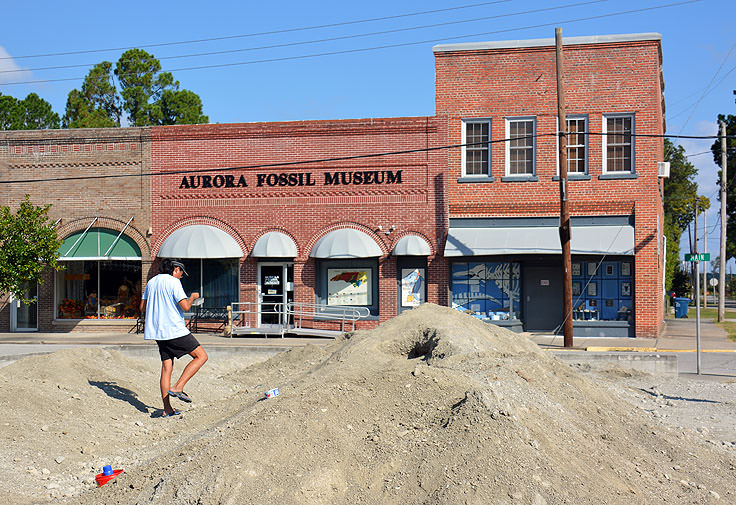
New exhibits are regularly sought after and displayed, including the recent acquisition of a completely fossilized cetacean skeleton, found in South Carolina, and dating somewhere between 5-23 million years old. The intact skeleton with a long beak-like mouth filled with razor sharp teeth is classified as one of the medium sized "toothed" whales, who were regulars in the Atlantic Ocean waters millions of years ago.
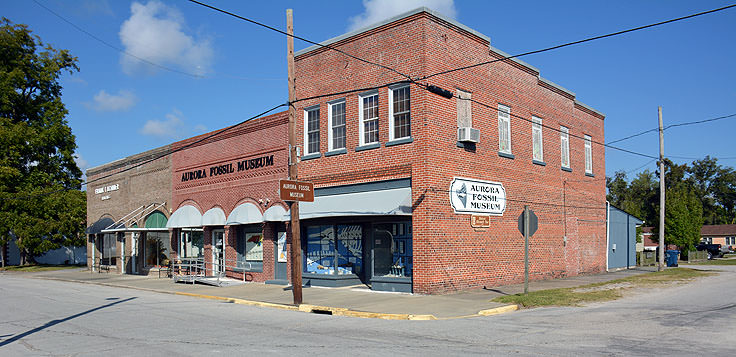
An archeology room showcases a comprehensive collection of arrow points, stone tools, jewelry and cooking implements of Native Americans from Eastern North Carolina, coupled with detailed murals that outline how these authentic tools were used in everyday life. A gift shop is also located on site with a wide selection of general science, geology and fossil related books, as well as a collection of fossils, gems and artifacts that are unparalleled in the Inner Banks shopping scene. Proceeds from the gift shop help keep the small museum open, accessible, and continuing to fascinate generations of new explorers.
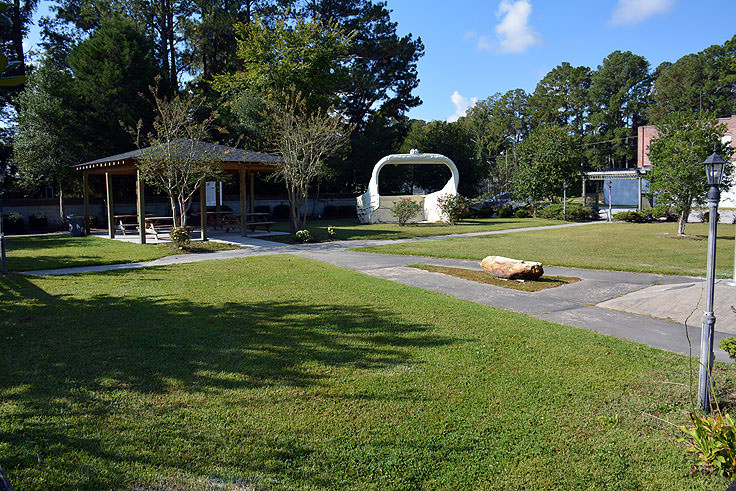
Of course, the biggest draw of the museum is the "Pit of the Pungo" itself, an unlimited fossil pit that is open to diggers and prospective archeologists of all ages. Fossil rich soils are added regularly to the pit, making each visit a new opportunity to uncover a distinctive find. These fossil deposits are excavated from coastal North Carolina, donated by the local phosphate mine adjacent to the Pungo River, and can contain any number of treasures. Visitors can expect to find remains of ancient sharks, whales, bony fish, corals, shells and other invertebrates, and staff are always on hand to answer questions and help identify noteworthy finds. Visitors are advised to bring a garden trowel and / or a sifter, as well as a couple of bags to secure their favorite fossilized prizes, and are welcome to spend a full day sifting through the pit, searching for buried treasure. It's not unusual for enthusiastic hunters to spend a full afternoon sifting through the gray, gravelly pile, and leave the premises with a full bag of ancient natural NC relics.
The museum and the Pit of the Pungo is open year-round, from Monday through Saturday, 9:00 a.m. until 4:30 p.m., and is open in the summer season, (generally March 1st through Labor Day), on Sundays, 12:00 p.m. until 4:30 p.m. Admission to both the pit and the museum are free for everyone, however donations and gift store purchases are gratefully accepted to ensure the museum remains a free and educational destination for Eastern North Carolina visitors.
School and special groups are welcome, and visitors who schedule a visitor for 10 people or more in advance can tailor their experience to include special educational sessions and programs. Interested groups are advised to call the museum well in advance to schedule a special tour or program at (252) 322-4238.
Fossil enthusiasts can also join the Friends of the Museum, a non-profit organization that helps the Aurora Fossil Museum accomplish its goal of educating the public on the geological forces and paleontological sediments that helped form the coastal plain of North Carolina. Members will receive a quarterly newsletter detailing Museum activities and events, a 10% gift shop discount, and admittance to special classes and programs seasonally offered at the museum. For more information, visit the Aurora Fossil Museum's website.
The Aurora Fossil Museum is quite literally an undiscovered treasure for most Inner Banks visitors, but for fossil aficionados, it's one of the best finds in North Carolina. Stocked with treasures dating back millions of years, and free to anyone with both a natural curiosity and a shovel, a visit to the Aurora Fossil Museum is a fun way for coastal visitors of all ages to uncover North Carolina's fascinating and far-reaching natural past.
Is this your business? Update your listing by messaging us
Welcome to your peaceful half acre waterfront getaway with a boat slip and dock in the impressive residential River Bend Community mins. from historic New Bern. Unwind on the huge, screened, covered porch overlooking the Trent River Canal or inside...


